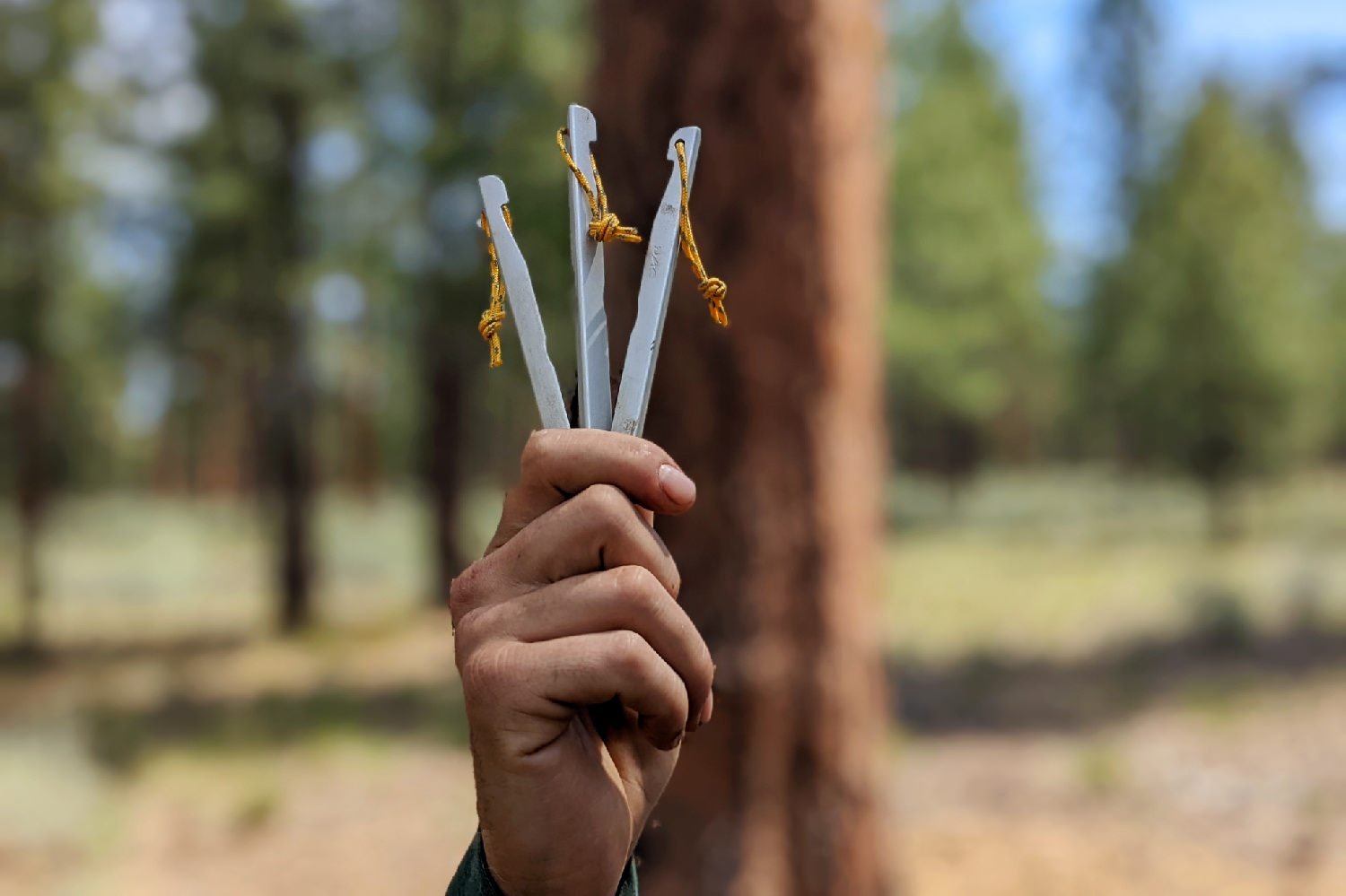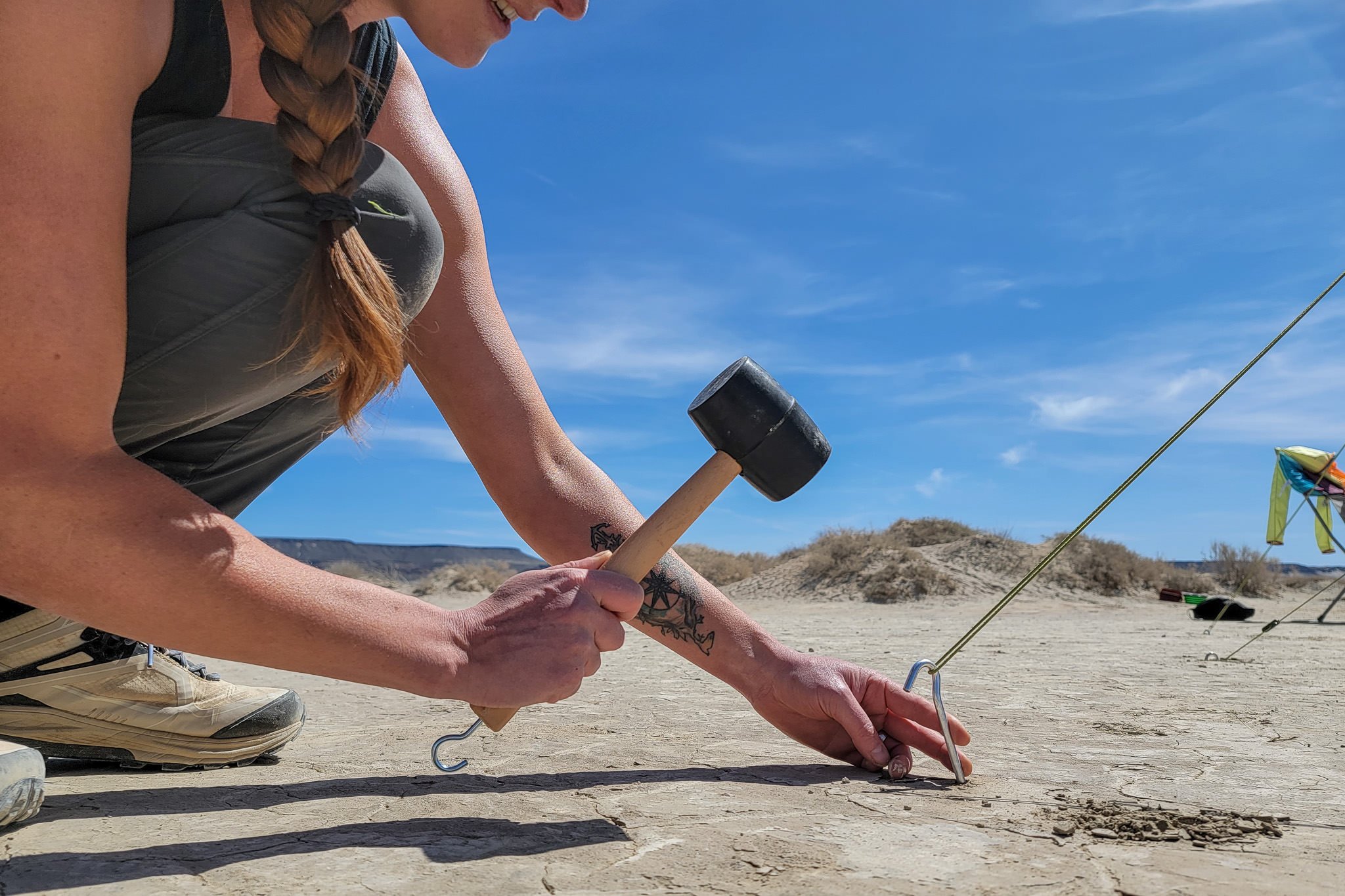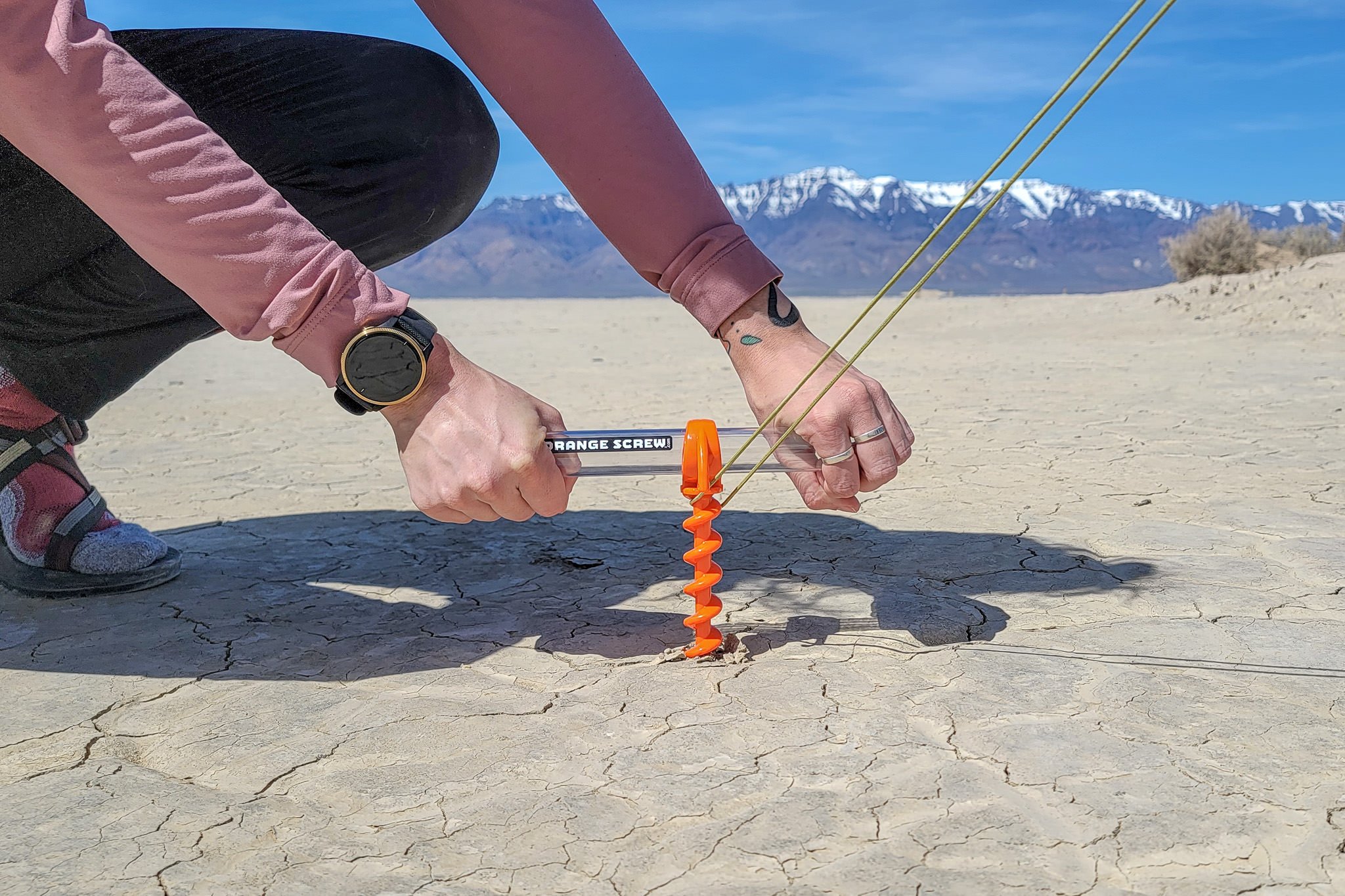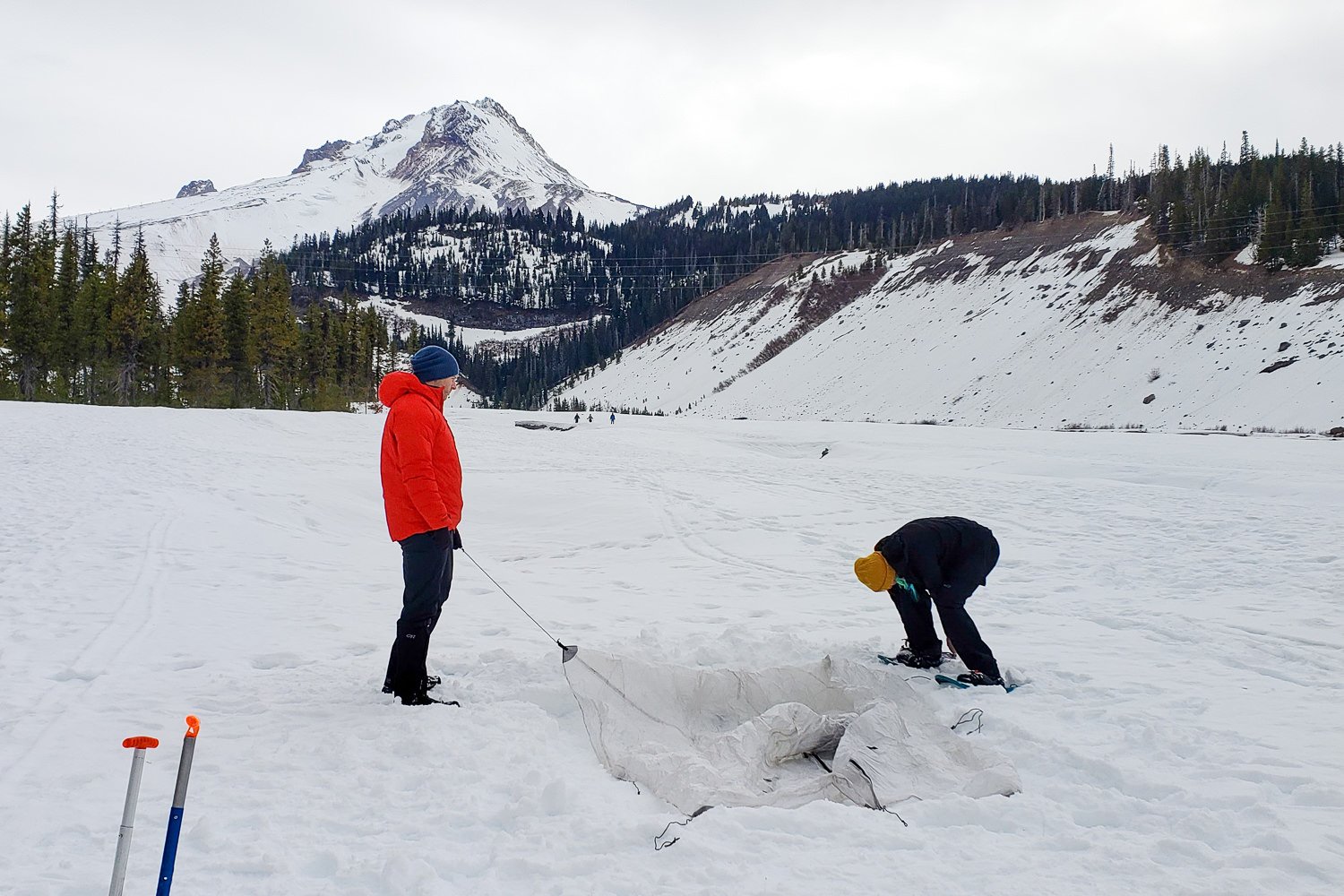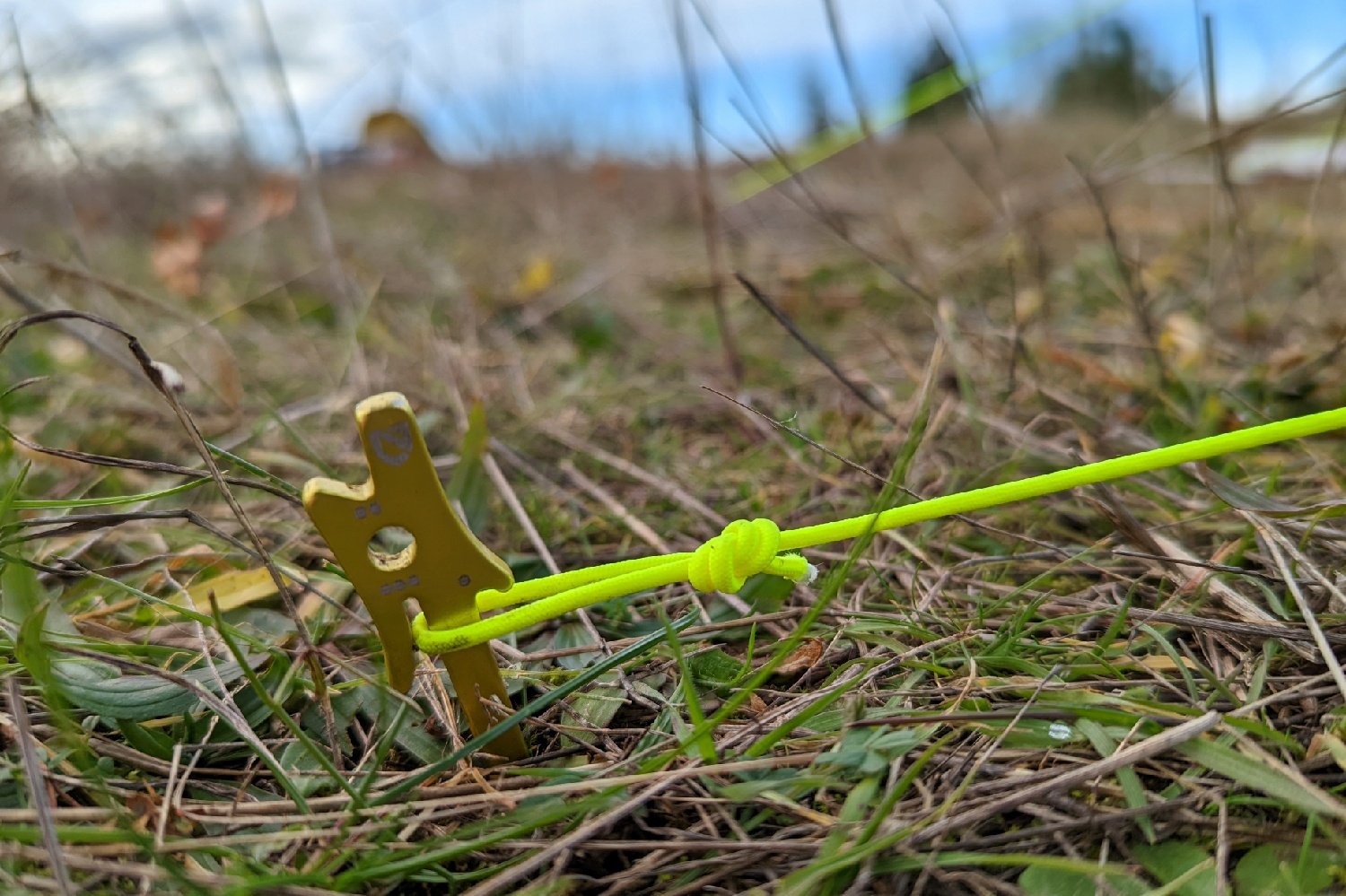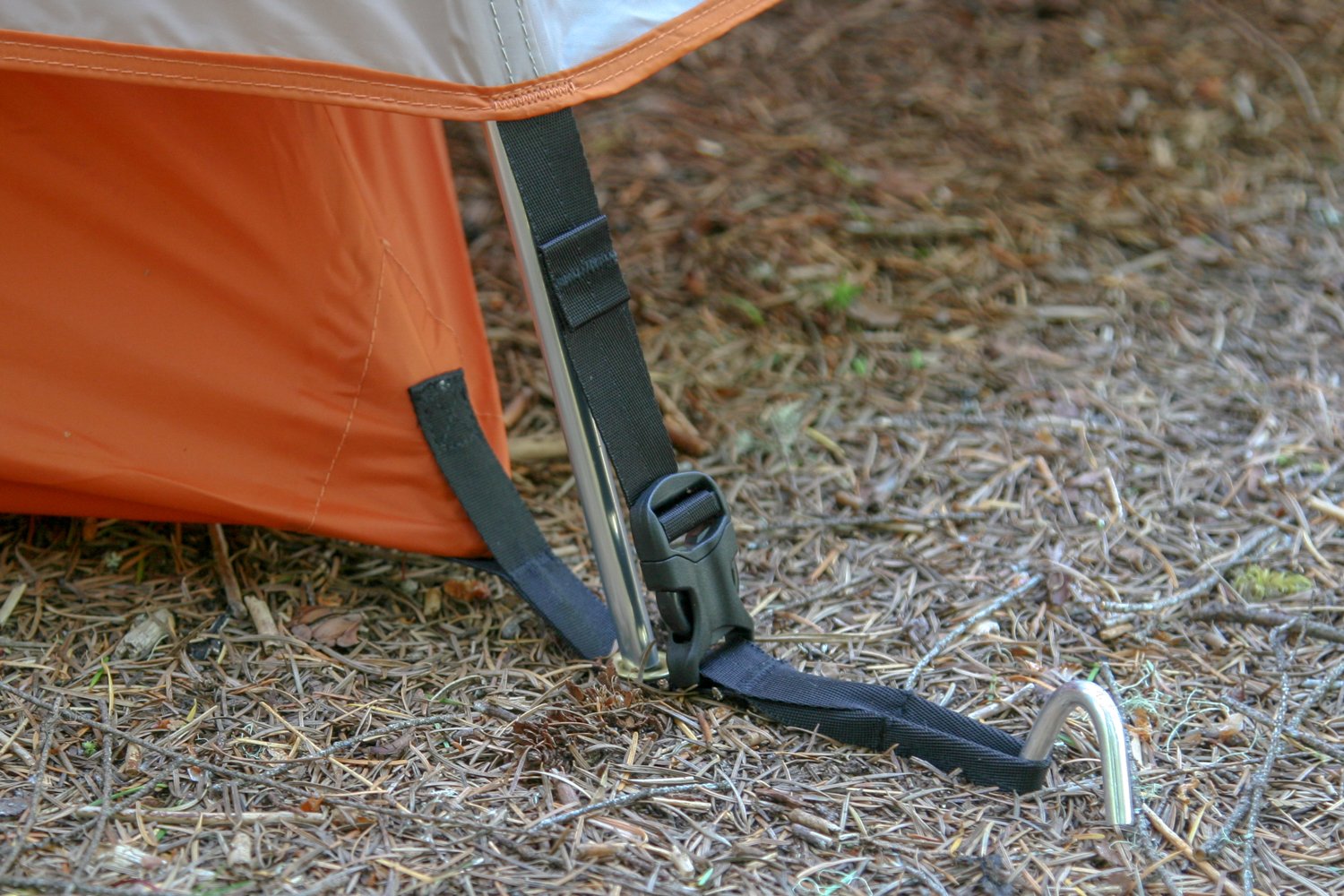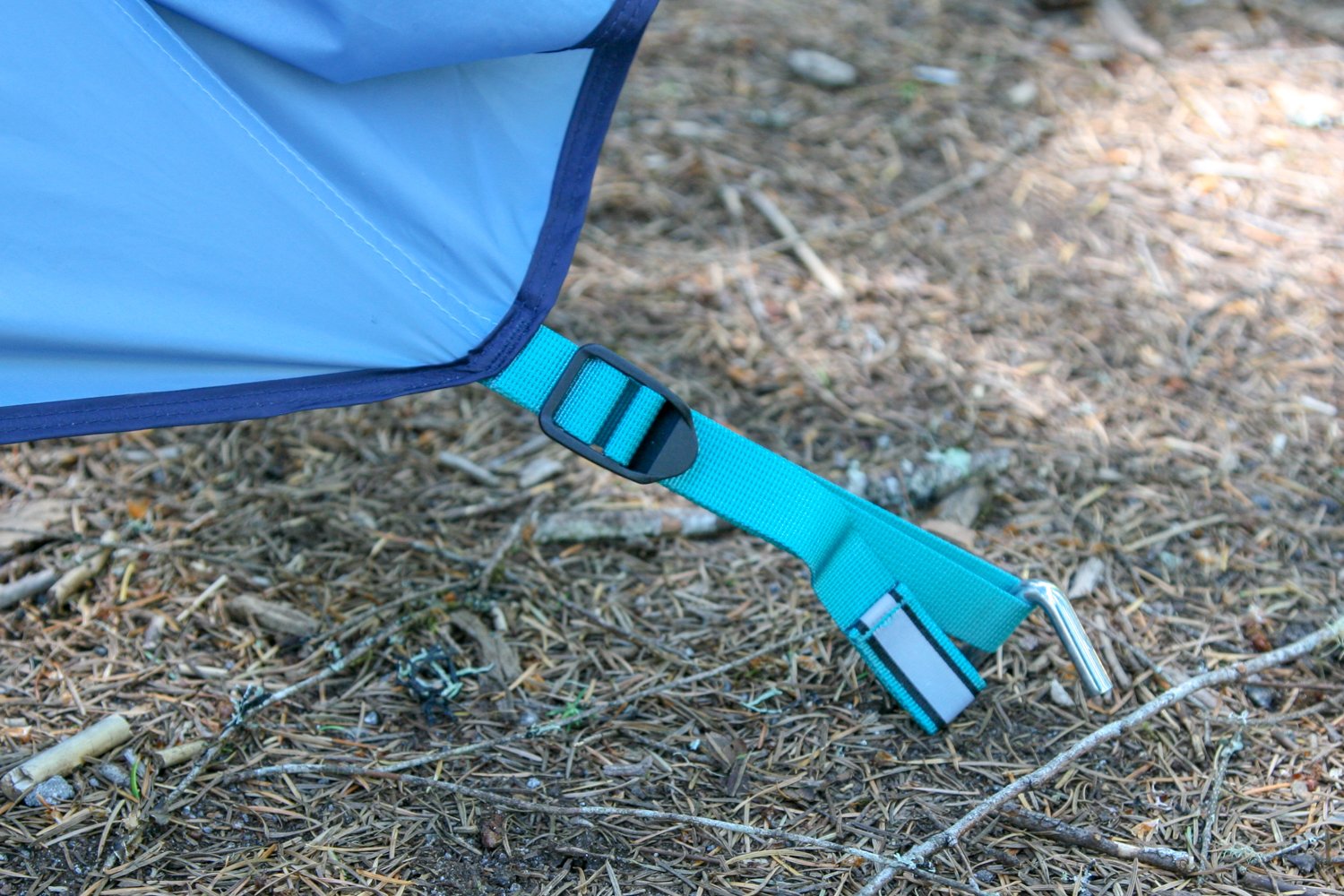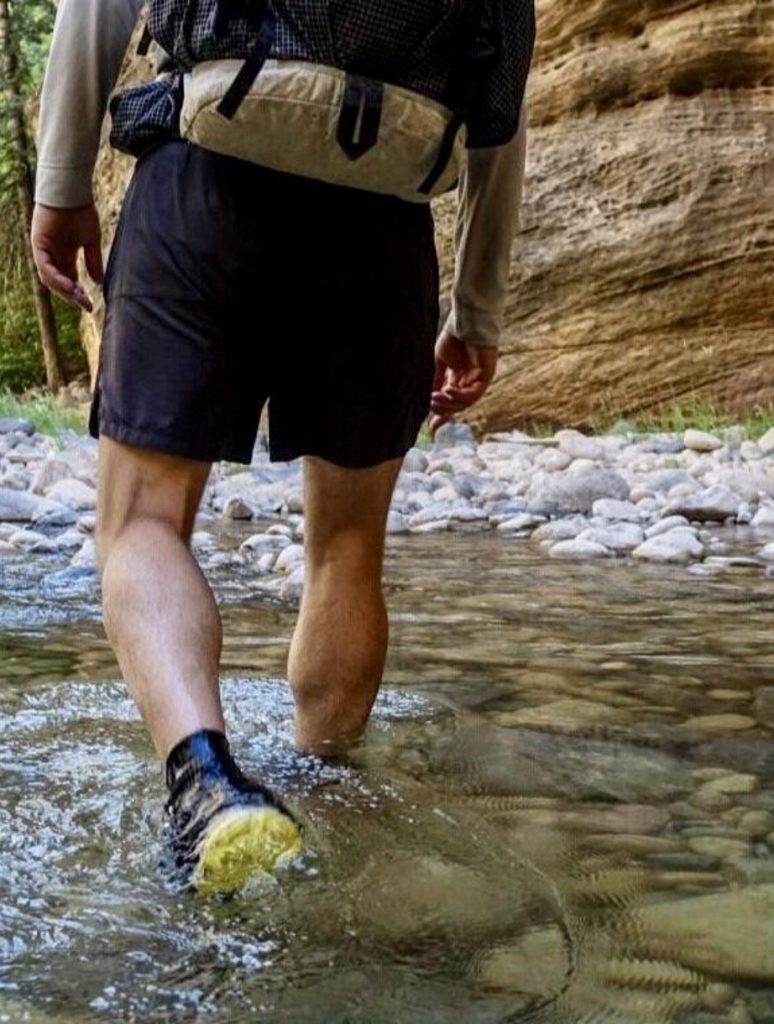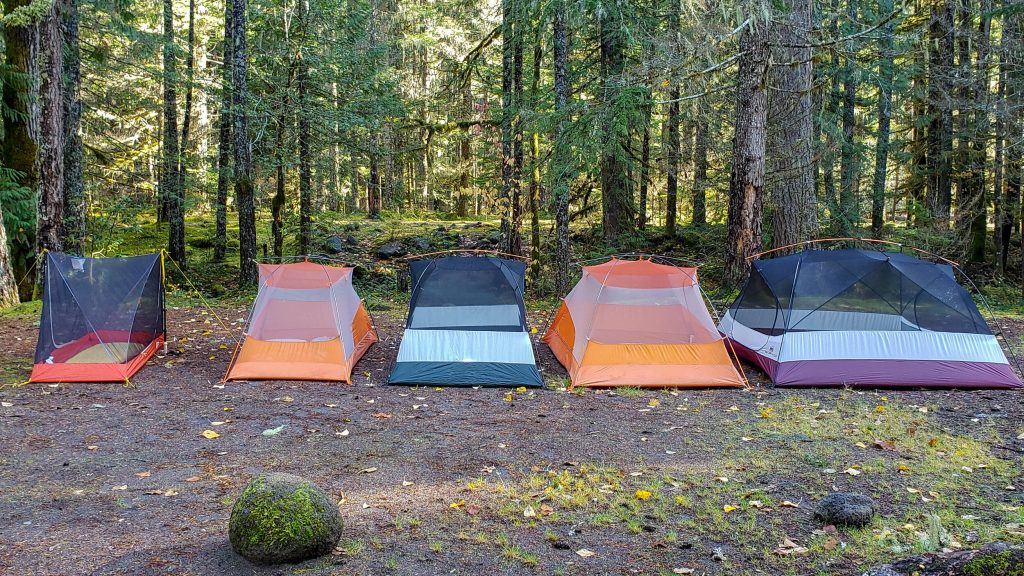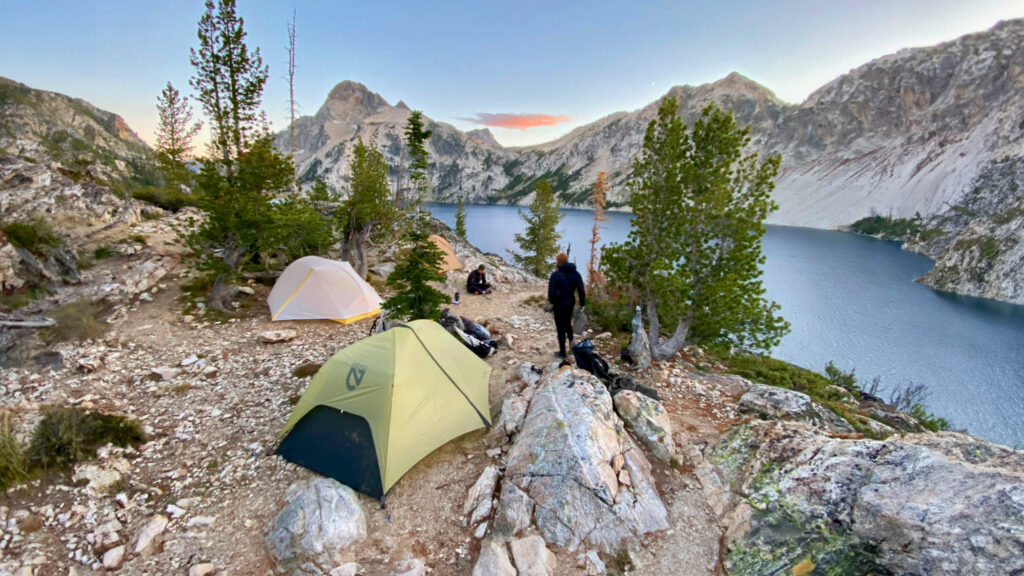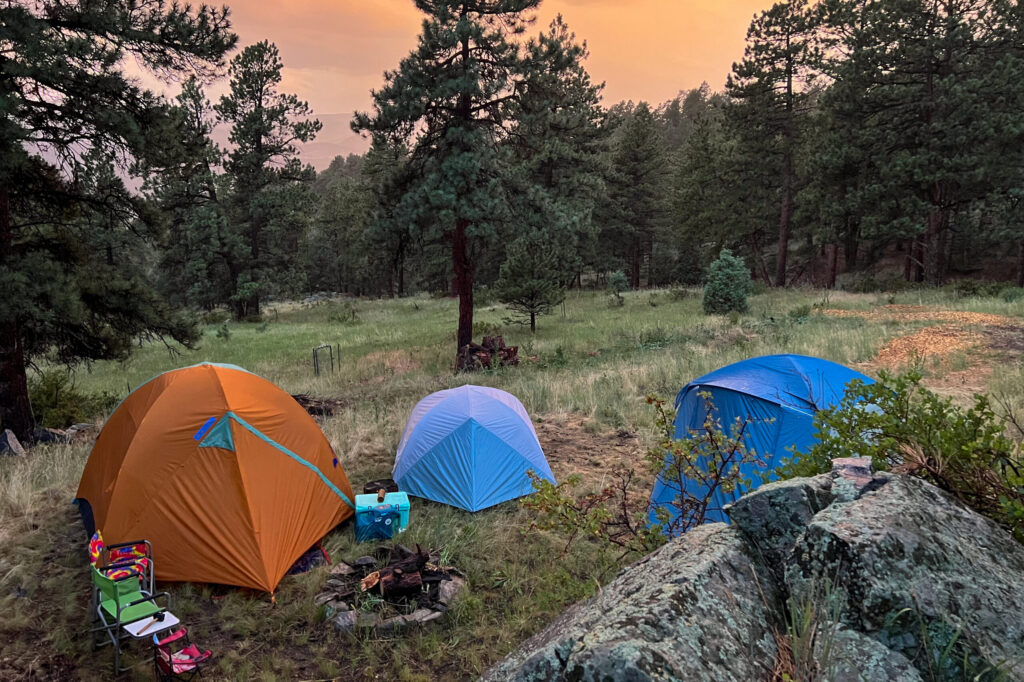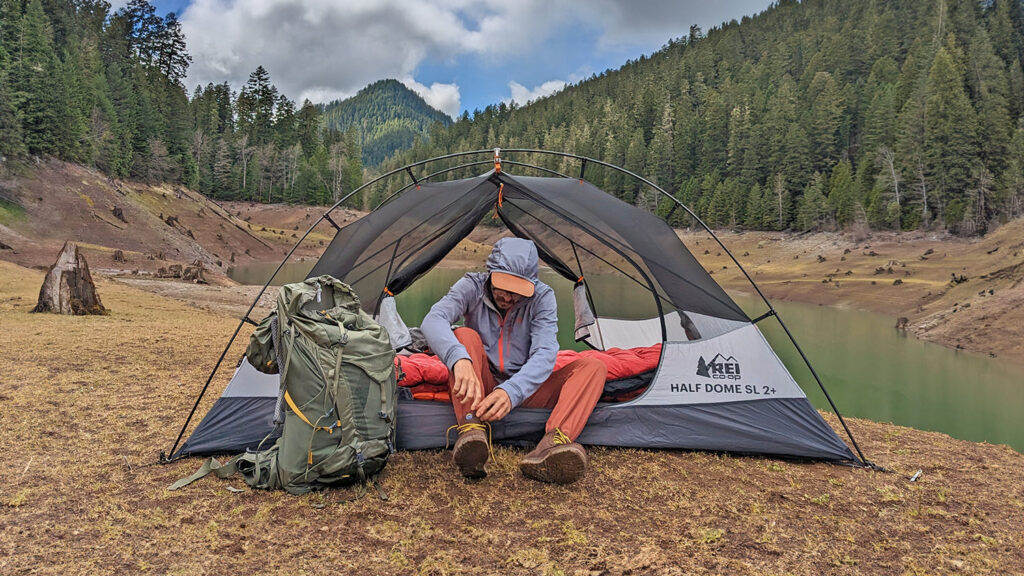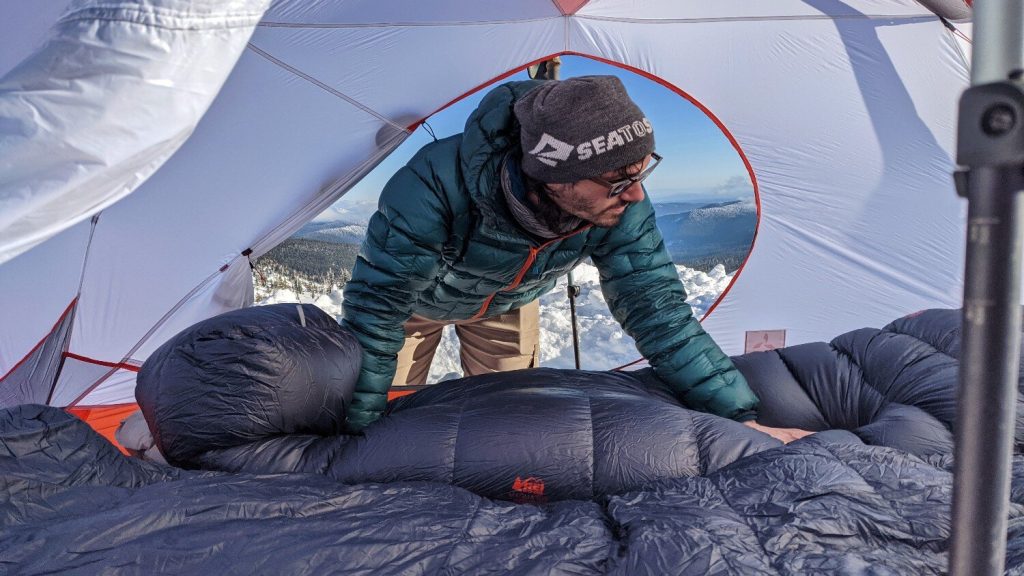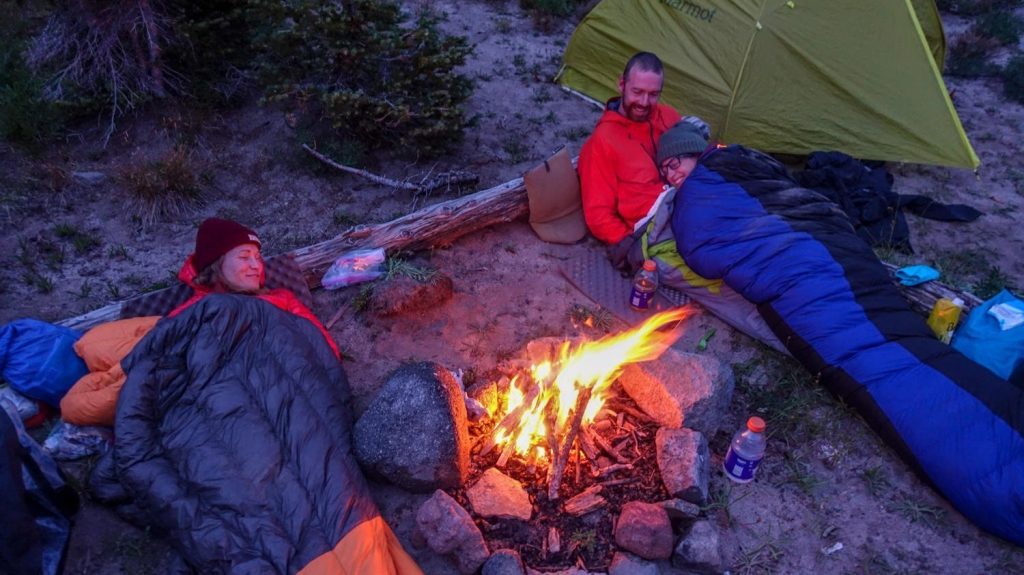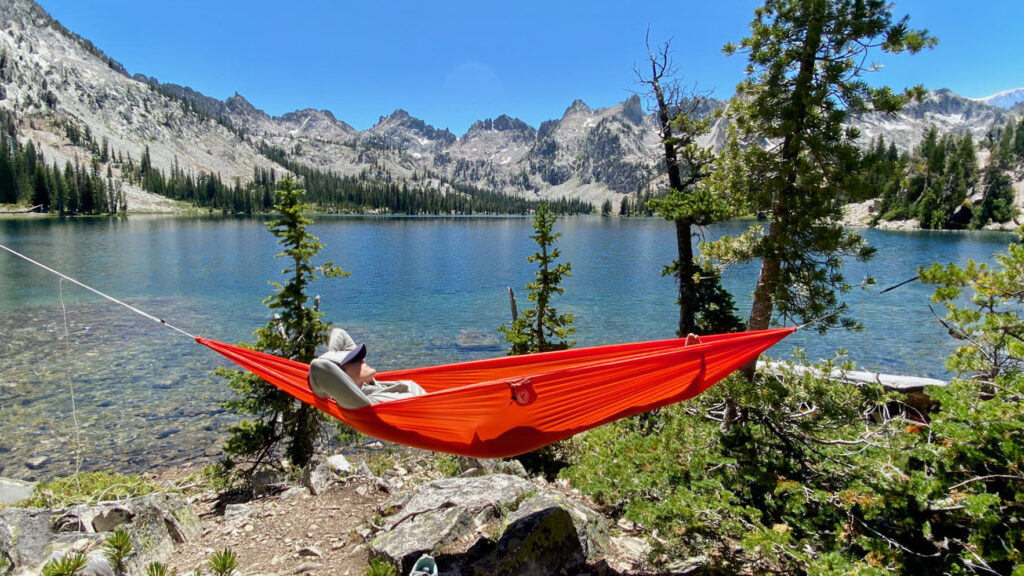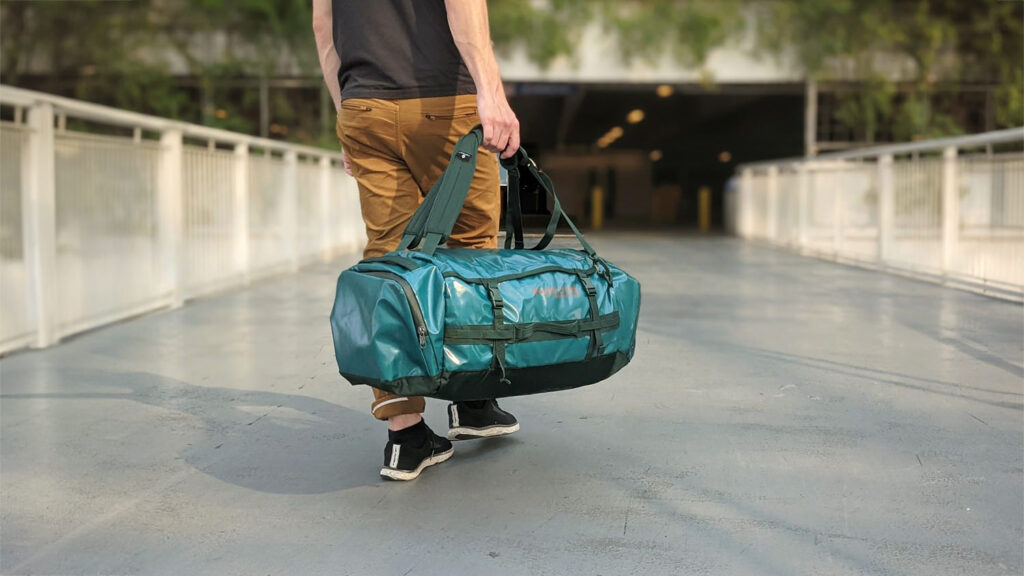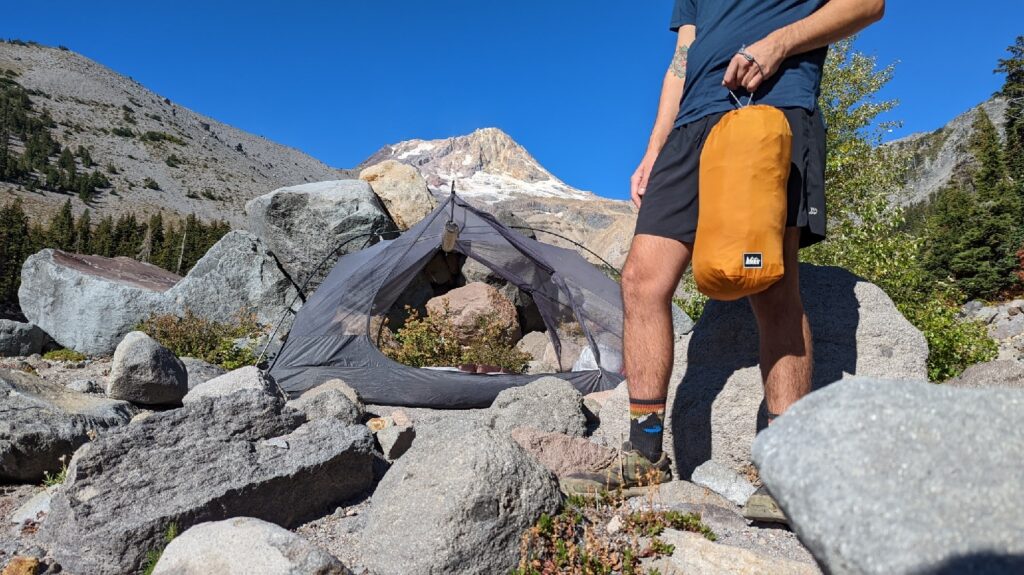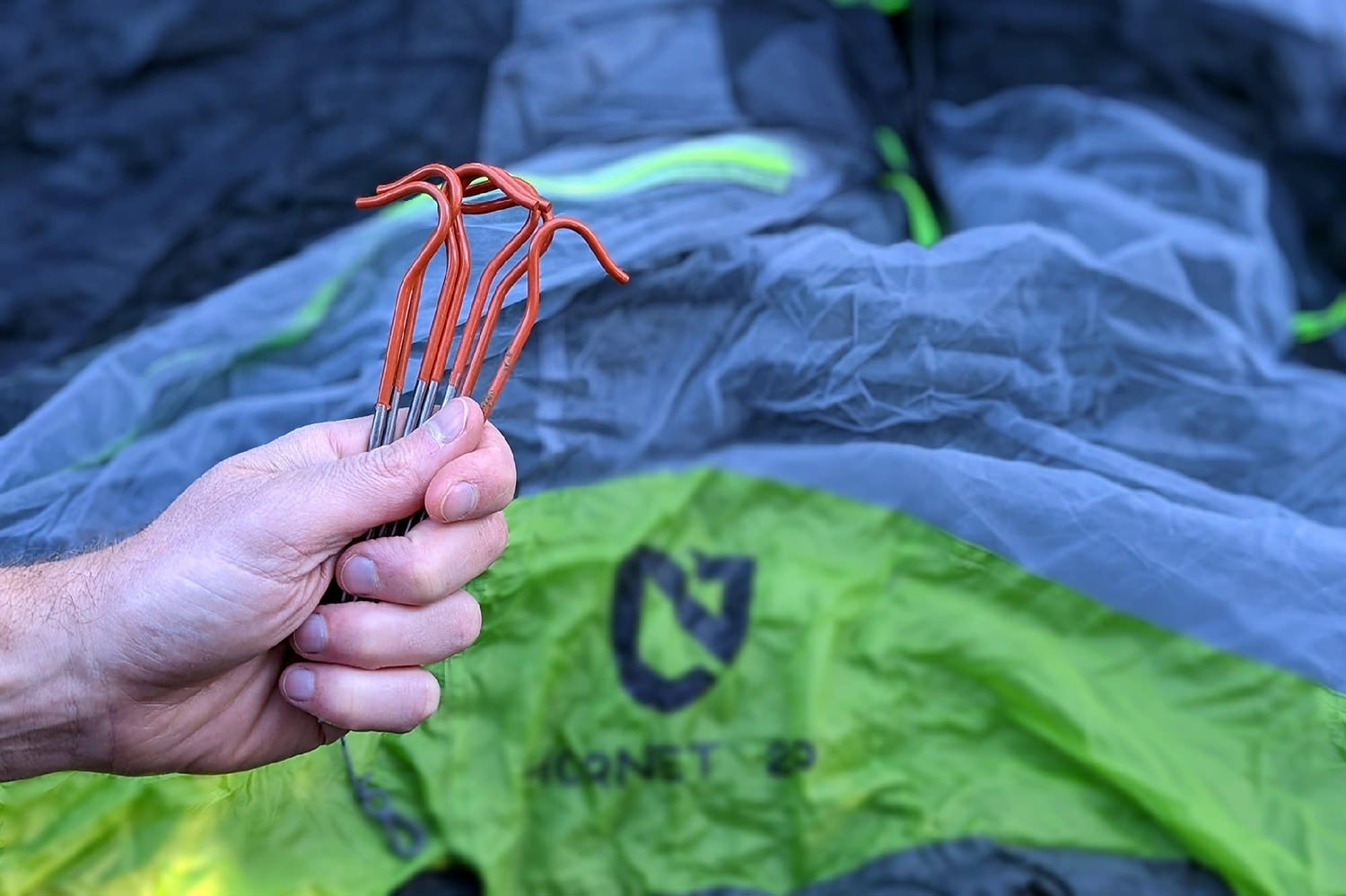
Over the years, we’ve had our fair share of mishaps and used more types of tent stakes in more types of terrain than any group of outdoor nerds really has any business doing. We researched 80 models and have hands-on experience with several dozen. We look at weight, packability, durability, and shape as well as price. From the crusty earth of high Sierra to the loamy soils of New England, this review of the best tent stakes has staying power. Whether you’re in the market for a set to kit out a tent that doesn’t have enough, you want to make an upgrade, or you need to replace a few bent or broken ones, we’ll help you find the best option for your needs.
And for more info, check out some of our other popular gear guides:
Quick Picks for Tent Stakes
Check out this quick list of our favorite tent stakes if you’re in a hurry, or continue scrolling to see our full list with in-depth reviews.
Best tent stakes overall: All One Tech Aluminum Stakes ($0.83 / stake)
Best hook tent stakes: REI Aluminum Hook ($2 / stake)
Best balance of low weight & strong holding power: MSR Ground Hog Stake ($4.95 / stake) / Mini ($4.50 / stake)
Best heavy-duty tent stakes for car camping: REI Steel Stakes ($2 / stake)
Best ultralight tent stakes: NEMO Airpin ($5 / stake)
Ultralight tent stakes that work well in rocky/compact ground: Vargo Titanium Shepherds Hook ($3.75 / stake)
Best snow stake: REI Snow Stakes ($6 / stake)
Ultralight tent stakes with great holding power: Zpacks V Stakes ($3.50 / stake)
Lightest tent stakes: MSR Carbon Core ($11.75 / stake)
Best tent stakes for anchoring large shelters in soft ground: Orange Screw Anchors ($7.75 / stake – small)
What’s new
We’ve been stomping on stakes this year to revisit our stalwarts and test out some new contenders:
- The All One Tech Aluminum Stakes are our favorites for their affordability and staying power.
- The REI Aluminum Hook is a classic, lightweight, hook-shaped stake that is easy to pull out of firm earth when it’s time to break down camp.
- The NEMO Airpin is ultralight, durable for the weight, fits in tight spaces, and holds guylines really well.
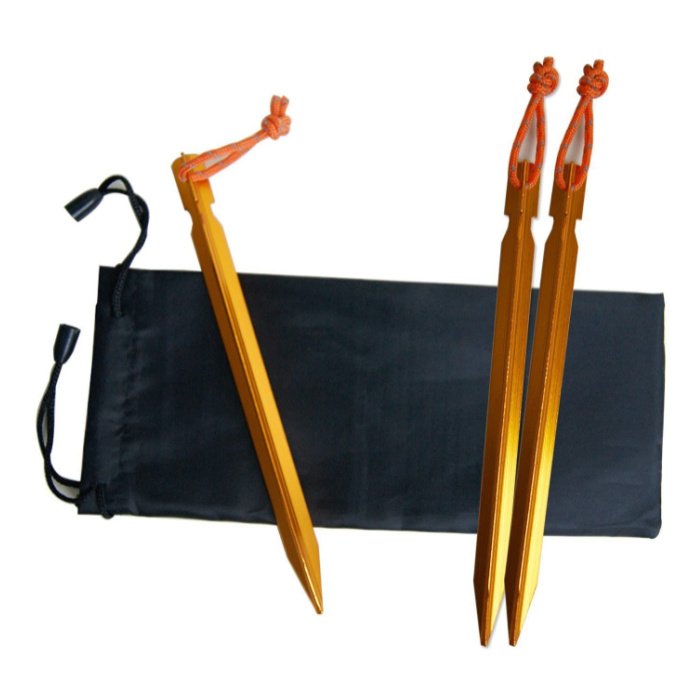
All One Tech Tent Stakes
Best tent stakes overall
Cost Per Stake: $0.83
Weight: 0.53 oz.
Length: 7 in.
Best Use: All-around
Pros
- Affordable
- Lightweight
- Versatile
- Good holding power
- High-visability pull cord for easy removal
- Stuff sack included
Cons
- Y stakes can be a little more difficult to use in rocky terrain
For those on a budget, the All One Tech Aluminum Stakes are an excellent option. These Y-shaped stakes are longer than a lot of other stakes, so they have some of the best holding power you can get in almost any type of terrain. On top of that, the length makes them suitable for both backpacking and car camping. They may be a little heavier and bulkier than ultralight stakes, but the All One Tech stakes’ balance of low weight, excellent holding power, and affordable price is pretty hard to beat.
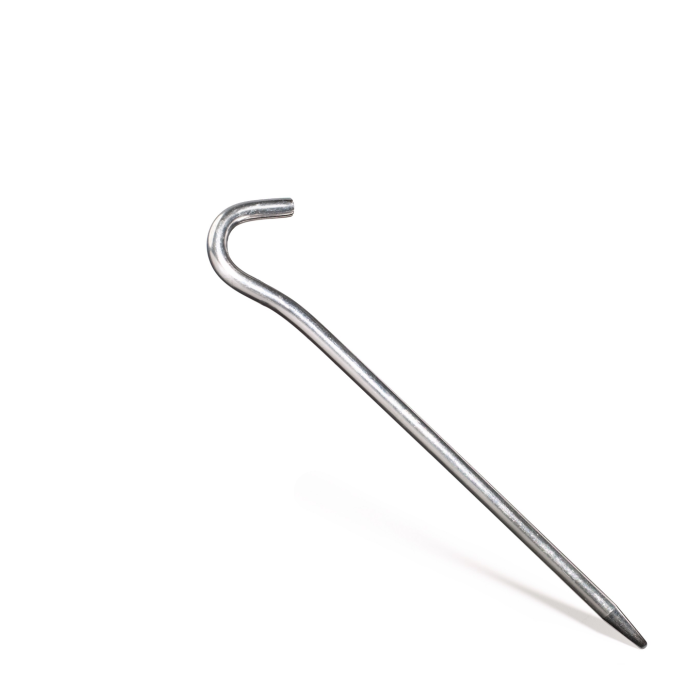
REI Aluminum Hook
Best hook tent stakes
Cost Per Stake: $2
Weight: 0.5 oz.
Length: 7.25 in.
Best Use: All-around
Pros
- Affordable
- Lightweight
- Versatile
- Durable
- Length/width means they'll hold well in most terrain
- Easy to drive in/pull out
Cons
- Not as good in loose sand
If you’re looking to get one set of stakes that will work for pretty much any occasion, do yourself a favor and pick up a handful of REI’s Aluminum Hook Stakes. They’re light enough for backpacking, strong enough to hold down large camping tents, and their shape and length mean they’ll work in pretty much any type of terrain. Gram counters can definitely go lighter with titanium or carbon fiber stakes, but we think the added durability and money saved by going with these aluminum hooks is worth the minimal extra weight.
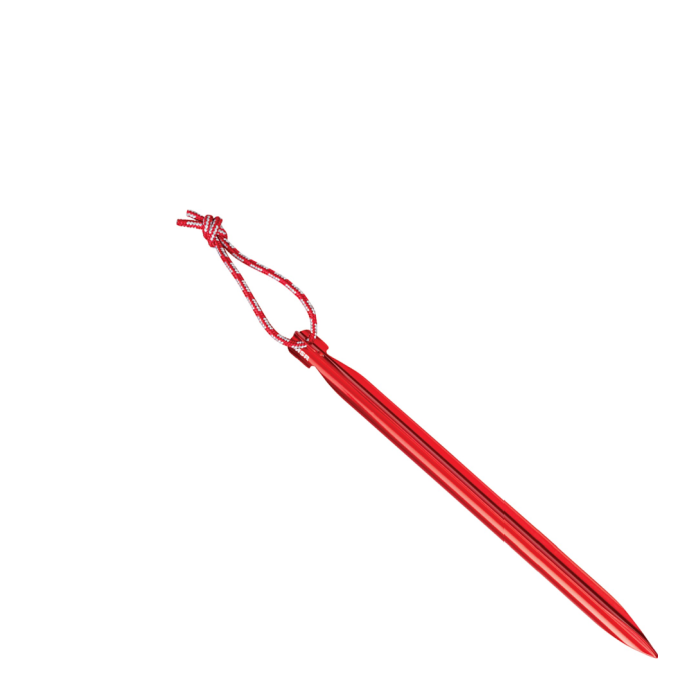
MSR Ground Hog & Mini Ground Hog
Best balance of low weight & strong holding power
Cost Per Stake: $4.95 / $4.50 (mini)
Weight: 0.5 oz. / 0.35 oz.(mini)
Length: 7.5 in. / 6 in. (mini)
Best Use: Backpacking
Pros
- Ultralight
- Great value
- Excellent holding power
- Very durable for how light they are
- High-visibility
- Pull cord for easy removal
Cons
- Y stakes can be a little more difficult to use in rocky terrain
The MSR Ground Hogs / Mini Ground Hogs have long been favorites among backpackers because they’re ultralight and they have excellent holding power. Y-shaped stakes like these are versatile enough to work in most types of ground, and their shape makes them more durable than thin hook stakes. If the best holding power possible in a lightweight package is your goal, go with the full-size Ground Hogs. If saving every last gram – and a little money – is most important to you, the Mini Ground Hogs are a great choice.
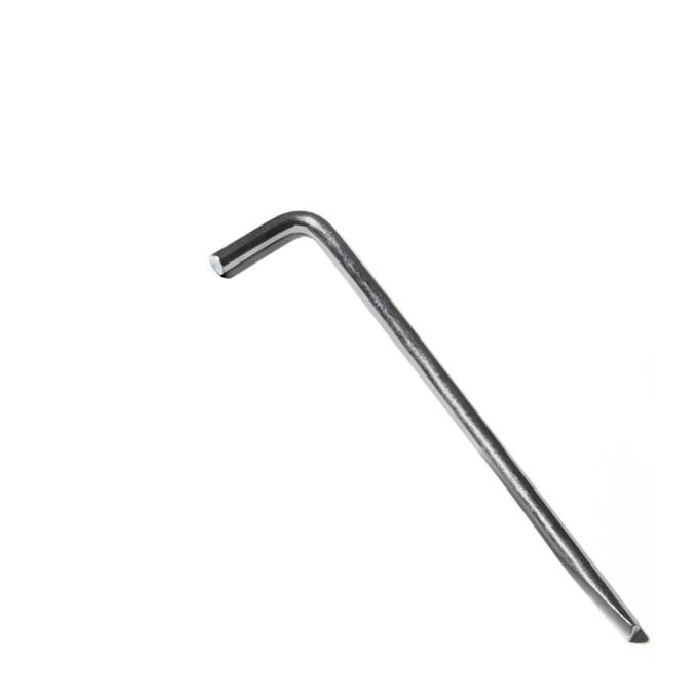
REI Steel Stake
Best heavy-duty tent stakes for car camping
Cost Per Stake: $2
Weight: 2.7 oz.
Length: 8.25 in.
Best Use: Car camping
Pros
- Affordable
- Durable
- Easy to drive in/pull out
- Lenght provides good holding power
Cons
- Heavy for backpacking
- Difficult to drive in without a mallet
The affordable and durable REI Steel Stakes are our go-tos for car camping. These stakes are heavy-duty and are over eight inches long, giving them excellent holding power in pretty much any type of terrain. But the ends are blunt, so come prepared with your favorite stake mallet to make driving them into compact ground a lot easier. Nine times outta ten, these are the stakes we’re using with our favorite large camping tents.
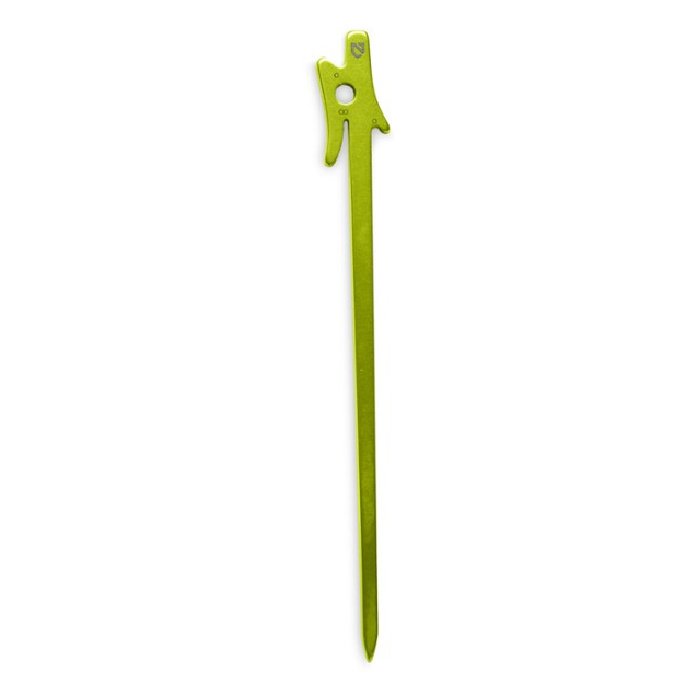
NEMO Airpin
Best ultralight tent stakes
Cost Per Stake: $5
Weight: 0.4 oz.
Length: 6 in.
Best Use: Backpacking; especially in compact/rocky terrain
Pros
- Ultralight
- Very durable for how light they are
- Thin design amkes it easy to get between rocks/roots
- Eliminates need for knots/tensioners on guylines
Cons
- Expensive
- Holding power isn’t as good in soft ground
NEMO’s ultralight Airpin stakes have a unique design with a self-tensioning cleat head that allows you to secure guylines without the need for knots or linelocs. For DIY ultralight backpackers who like to swap out stock guylines and hardware on their tents and tarps, this means you can save even more weight by eliminating tensioners. We often bring a couple of these in our stake kit because they’re good backup if tensioning hardware fails, and their thin design makes them easy to use in rocky terrain where thicker stakes are more difficult to drive in. The Airpins are some of the more expensive stakes on our list, but their practical design, low weight, and durability makes them worth the cost in our opinion.
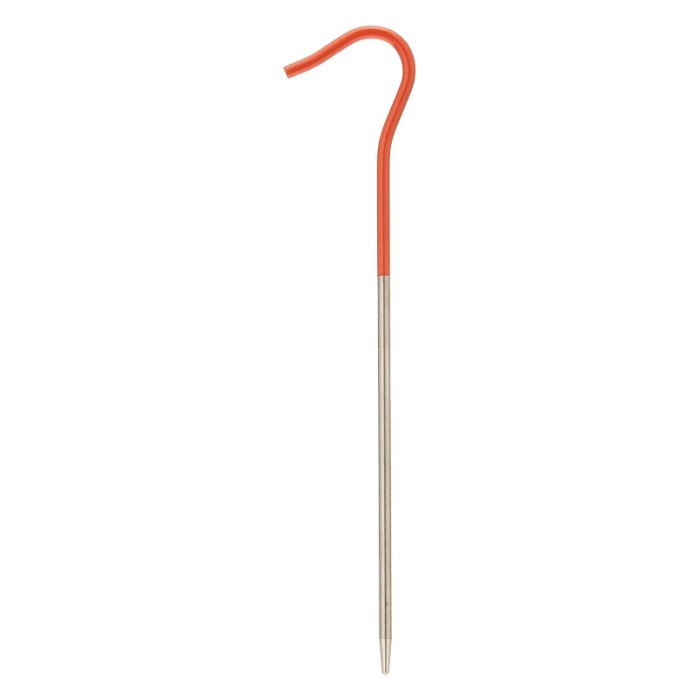
Vargo Ti Shepherds Hook
Ultralight tent stakes that work well in rocky/compact ground
Cost Per Stake: $3.75
Weight: 0.3 oz.
Length: 6.5 in.
Best Use: Backpacking; good in packed soil & rocky terrain
Pros
- Ultralight
- Thin design makes it easy to get between rocks/roots
- High-visibility top
- Easy to drive in/pull out
Cons
- Bends easily
- Holding power isn't as good in soft ground
The ultralight Vargo Titanium Shepherds Hook stakes are super thin, so it’s very easy to slip them in between rocks and roots where other stake shapes might get stuck. The thin gauge also means they’re easier to bend, however titanium is pretty resilient and can bend quite a bit before it actually breaks. The shape and length limit their usefulness somewhat in soft or sandy ground, but it’s easy enough to make them work if you can find some heavy rocks to anchor them in with. The Vargo Shepherds hooks are the second lightest stakes on our list, but they’re nearly three times less expensive than the absolute lightest (the MSR Carbon Core).
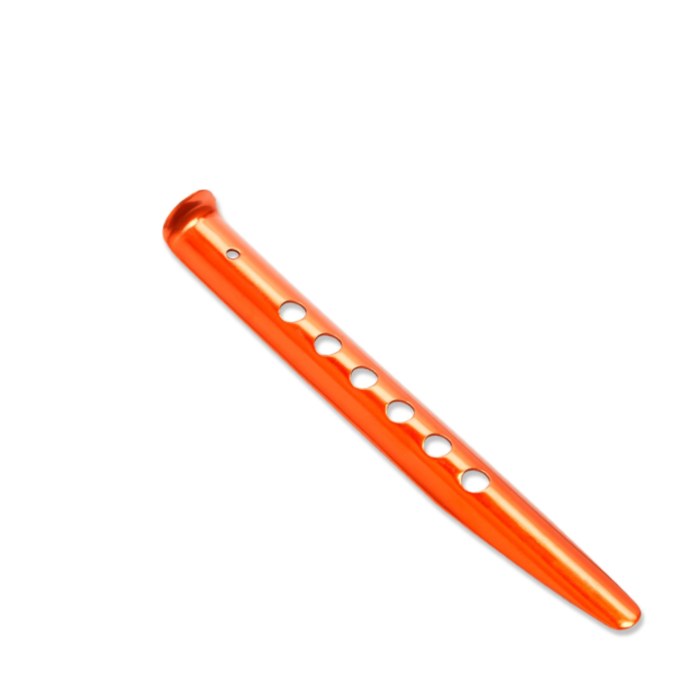
REI Snow Stake
Best snow stake
Cost Per Stake: $6
Weight: 1 oz.
Length: 9.6 in.
Best Use: Tenting in snow/sand
Pros
- Durable
- Good value compared to other snow stakes
- Excellent holding power in loose sand/snow
- High-visability color
Cons
- Not suitable for compact ground
- more expensive than less specialized stakes
REI’s Snow Stakes have awesome holding power in soft snow and sand. They’re designed with a flat top that makes them comfortable to drive into the ground with your shoe, but their wide tip makes them impractical for use in compacted soil and icy snow unless you’re willing to dig out a hole to use them as deadman anchors. Some members of the CleverHiker team carry one of these on most backpacking trips since it can double as a tent stake and a cathole trowel.
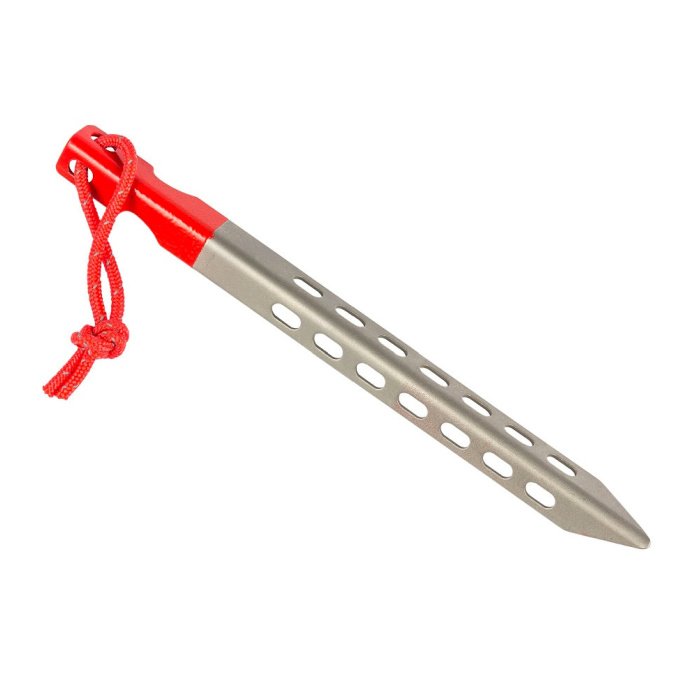
Zpacks V Stake
Ultralight tent stakes with great holding power
Cost Per Stake: $3.50
Weight: 0.39 oz.
Length: 6.5 in.
Best Use: Backpacking
Pros
- Ultralight
- High-visiability top
- Good holding power
- Easy to pull out
Cons
- Can be uncomfortable to drive in with your shoe
- Bends easily
The Zpacks V Stakes are much lighter and more affordable than other stakes made specifically for soft ground. We often bring a couple of these in our backpacking stake kit for better holding power on critical guylines in loose terrain. But they’re shorter and they bend easier than many other V-shaped stakes, so they may not be the best choice for building a full kit. That said, these stakes are still an excellent value for the holding power and low weight.
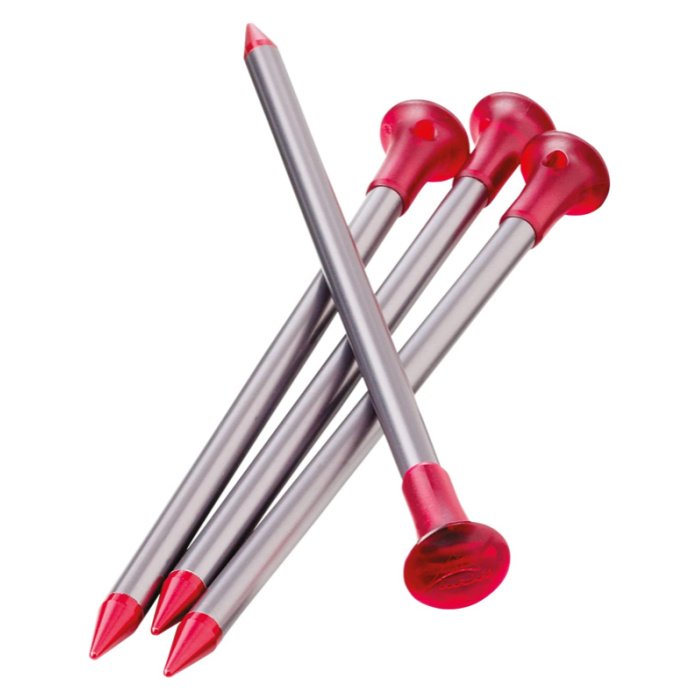
MSR Carbon Core
Lightest tent stakes
Cost Per Stake: $11.75
Weight: 0.2 oz.
Length: 6 in.
Best Use: Backpacking; works best in compact soil
Pros
- Ultralight
- High-visibility top
- Easy to drive in compact soil
Cons
- Expensive
- Holding power isn't as good as others
- Can be hard to remove
- Carbon fiber breaks instead of bending under stress
The MSR Carbon Cores are some of the absolute lightest tent stakes on the market, which means you’ll pay a premium price for them. These carbon fiber stakes hold well in compact soil, and their flat top and pointed tip make them very easy to drive into the ground. While these are the lightest option for gram counters, we don’t recommend using them as the sole stake type in your kit. For trips where saving every gram counts, we might bring four or five of these and two or three titanium or aluminum stakes. This is because the short length of the Carbon Cores makes them less effective in loose ground, the thicker diameter makes them slightly harder to use in rocky ground than thinner stakes (like the Vargo Shepherds Hooks), and carbon fiber will snap when under too much stress rather than bending.
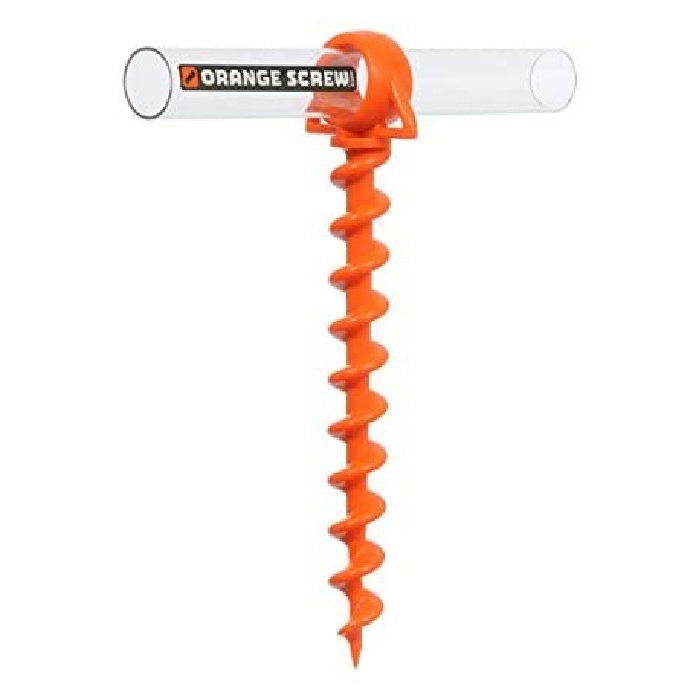
Orange Screw Ultimate Ground Anchor
Best tent stakes for anchoring large shelters in soft ground
Cost Per Stake: $7.55 (small)
Weight: 1.8 oz.
Length: 9.5 in.
Best Use: Car camping; especially on soft ground
Pros
- Excellent holding power in soft ground
- Easy to scrfew into soft ground
- Eliminates need for stake mallet or driving in with you foot
Cons
- Expensive
- Too heavy/bulky for backpacking
For windy days on the beach, we wouldn’t be caught without our Orangescrew Anchors. These stakes are perfect for anchoring down your camping tent or sun shade in loose sand or sediment, and will provide a more secure hold than any other stake type. We also like that the screw design means we can leave the stake mallet at home and we don’t have to try to drive a stake into the ground with our flip flops. The Orangescrews are quite expensive, though, so they may not be a practical purchase for those who do most of their camping in forests or in other areas with hard-packed ground.

What’s Most Important to You in a Tent Stake?
PRICE
The material of a tent stake will generally determine the cost. Steel stakes are an affordable option for frontcountry camping and they’re super durable. Plastic stakes are typically the cheapest, but they’ll also be some of the least durable and versatile. Aluminum stakes are a great value because they balance low weight, durability, and versatility. Ultralight tent stakes made from titanium and carbon fiber often add just fractions of an ounce but can get pretty spendy.
Best value tent stakes
Best budget tent stakes
Best high-end tent stakes
WEIGHT / DURABILITY
Steel stakes are the strongest, but they’re heavier than we prefer for backpacking. Aluminum has a great balance of weight and durability, so these types of stakes are typically a good choice if you’re not concerned with saving every gram of pack weight. Titanium stakes are ultralight, but they will bend relatively easily. Carbon fiber stakes are usually the lightest, but the tradeoff is that carbon fiber snaps rather than bends so once you press too hard in the wrong direction, there’s no going back.
Best ultralight tent stakes
Best lightweight tent stakes
Best heavy-duty tent stakes
Best balance of weight & durability
BEST USE
Shape and length will tell you a lot about what terrain a tent stake will excel in. Y-shaped stakes don’t bend easily and hold really well in packed soil, but their wider shape may make them tougher to get into rocky terrain. V-shaped stakes – especially the kind with holes running along the shaft – and screw stakes do very well in sand and snow. Hook and nail stakes can be easier to use in rocky soil, because they’re narrow. But their holding power isn’t as good. Generally, the longer the tent stake and the more surface area it has, the better the holding power.
Best tent stakes for backpacking
- All One Tech Aluminum
- REI Aluminum Hook
- MSR Groundhog
- MSR Mini Groundhog
- NEMO Airpin
- Vargo Titanium Shepherds Hook
- Zpacks V Stake
Best tent stakes for car camping
Best tent stakes for sand
Best test stake for snow
Critical Tent Stake Considerations
GETTING A SECURE HOLD
Getting a secure hold with your tent stakes can be critical to staying dry and comfortable in your shelter during inclement weather. Here are some tips to help maximize the holding power of your tent stakes:
- Drive your stake straight into compact ground to get it as deep as possible or at a very slight angle (away from the tent) in softer ground
- Stake guylines straight out from their attachment points, not at an angle
- Secure shorter/weaker stakes by placing a rock on top of them
- Face the most narrow side of your tent into the wind to reduce surface area that can catch gusts
- Stake out all additional tie-outs in high winds and heavy precipitation
- Using a rock or mallet to pound stakes in will reduce the risk of bending one
- Use the right kind of stake for the terrain (see TENT STAKE SHAPES below) – for backpacking, it’s a good idea to build your kit with a variety of stake shapes
TENT STAKE SHAPES
The shape of a tent stake will tell you everything you need to know about what type of terrain it will be most effective in.
- Y stakes – These stakes provide excellent holding power in all types of terrain. They’re more durable and harder to bend than other stake shapes, but they may be harder to get around rocks buried in the ground. (Example: MSR Groundhog)
- V stakes – Sand and snow settle into the holes in the shaft of these stakes, giving them excellent holding power in loose terrain. V stakes made from aluminum or titanium may bend easily if driven too hard into compact ground or rocks. (Example: Zpacks V Stake)
- Shepherds hook – These stakes are typically very lightweight. They’re thinner than Y and V stakes, so they’re easier to slip in between roots and rocks. That said, the thin diameter reduces their holding power and can make them bend more easily. (Example: REI Aluminum Hook)
- Nail – These stakes are typically very lightweight, but they usually have a less prominent notch for securing a guyline. Nail stakes with thicker diameters will have decent holding power, but generally this type of stake will need to be reinforced with a rock. (Example: MSR Carbon Core)
- Screw – A specialized stake shape that will provide excellent hold in any type of ground you’re able to drive them into. We typically use these for car camping or securing sun shades in sand. (Example: Orangescrew Ultimate Anchor)
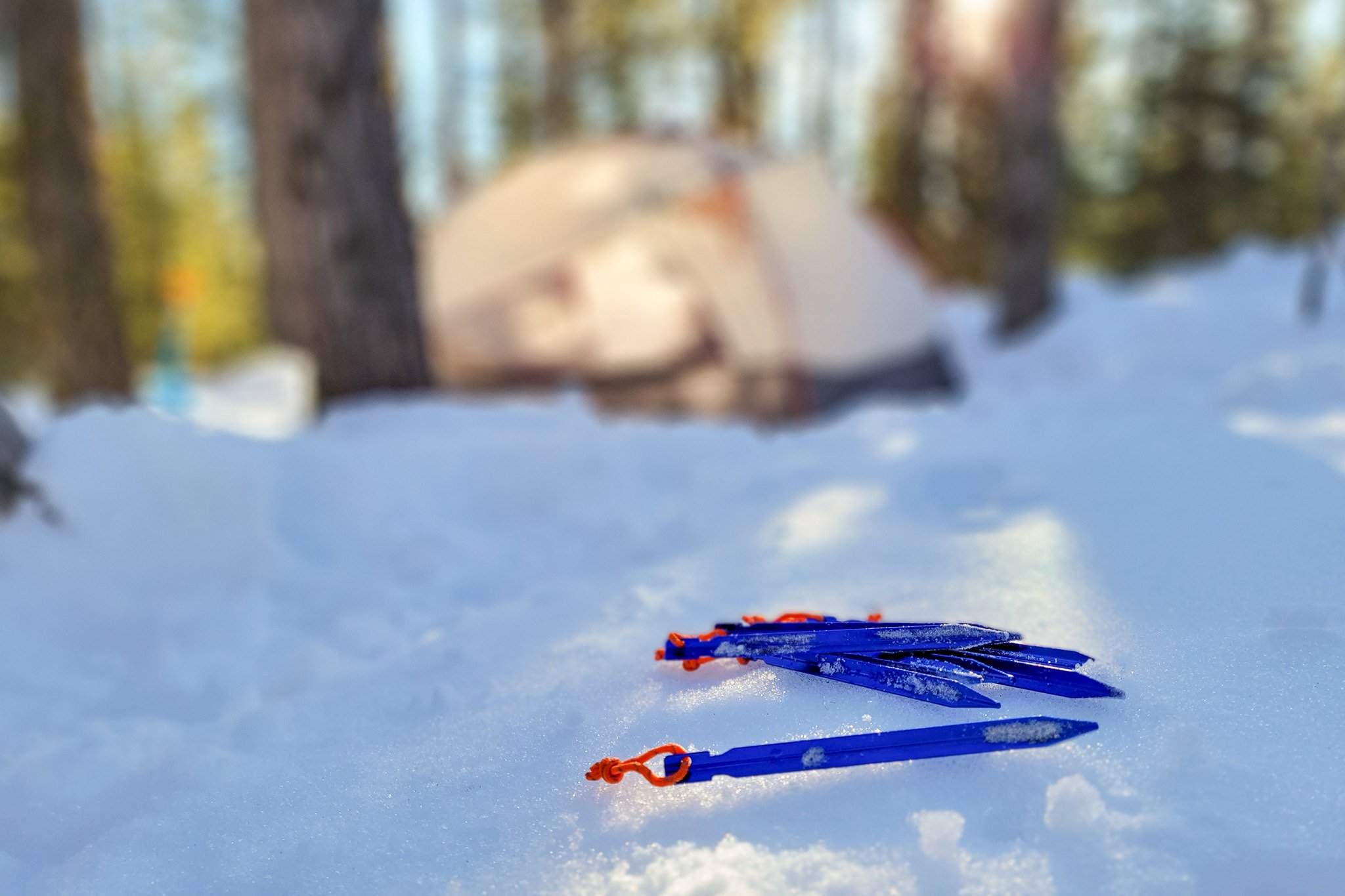
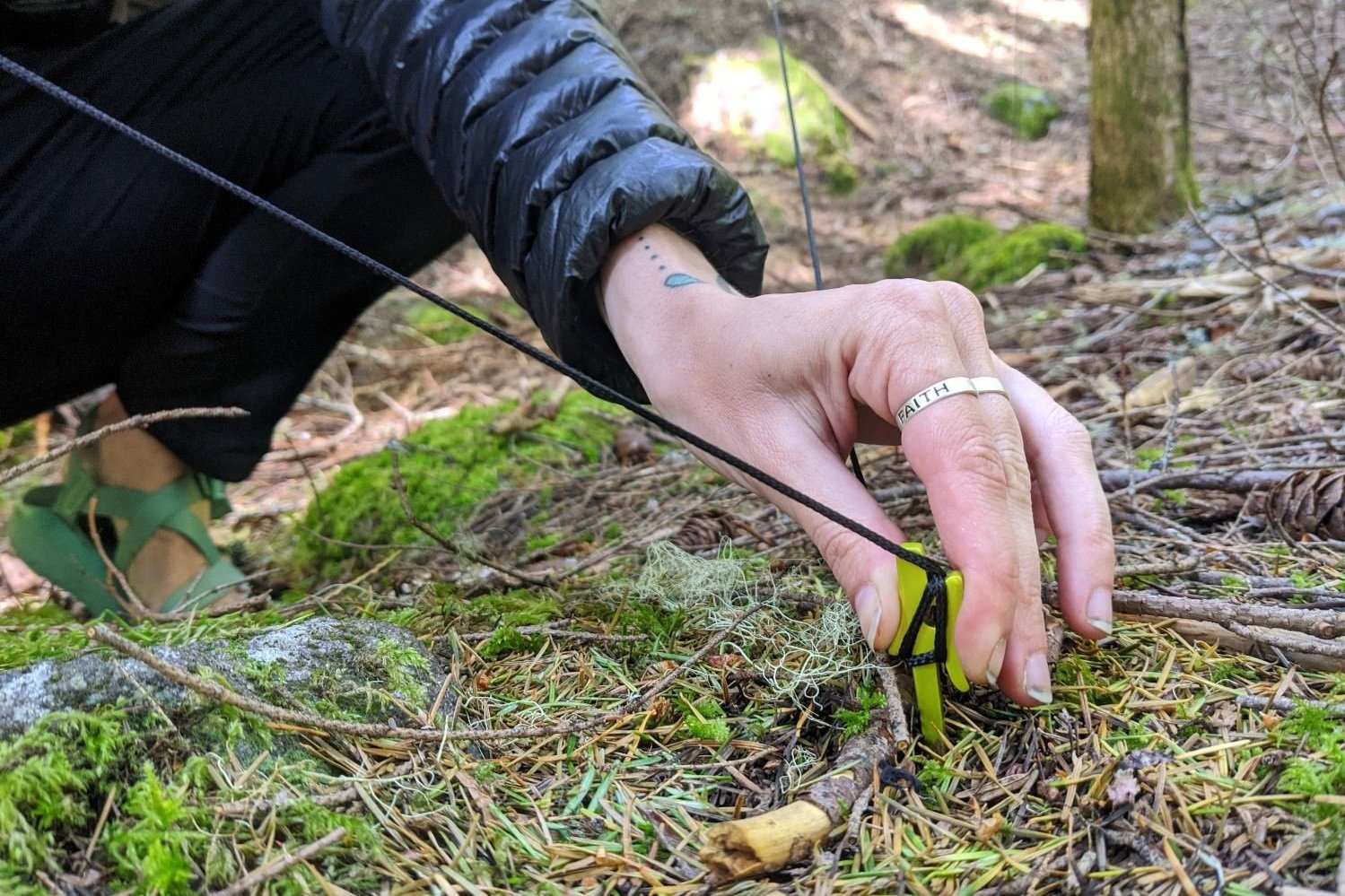
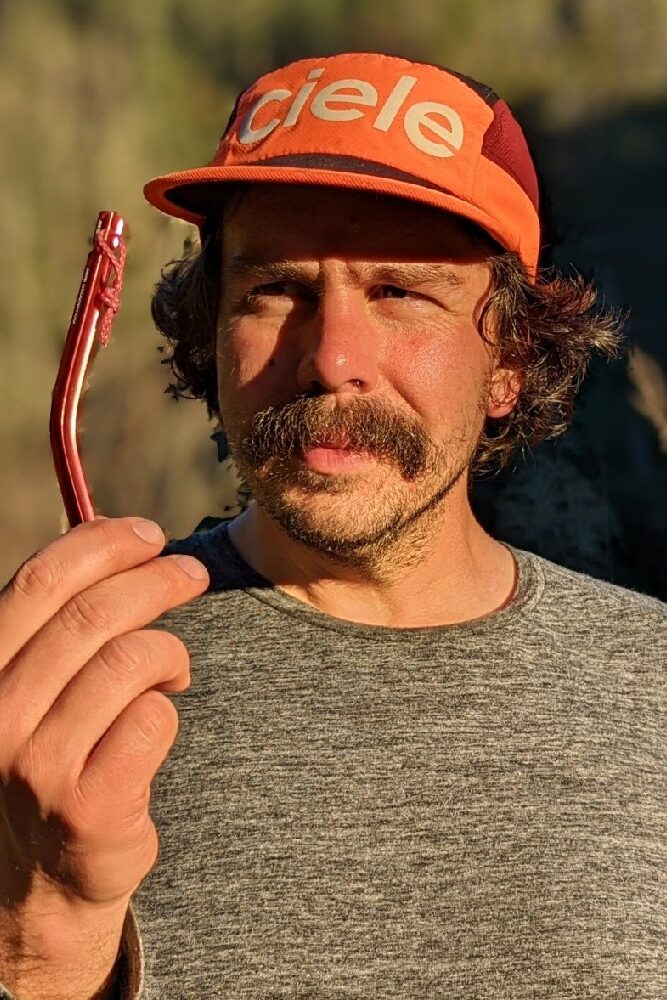
WHAT IF I CAN’T GET MY TENT STAKE IN THE GROUND?
In areas where the terrain makes it pretty much impossible to drive in a tent stake, you’ll almost always still have some options! Try tying your tent guylines off to large branches or wrapping them around heavy rocks. If you can’t find any suitable rocks or branches nearby, you can always weigh the interior corners down with heavier gear items as a last resort.
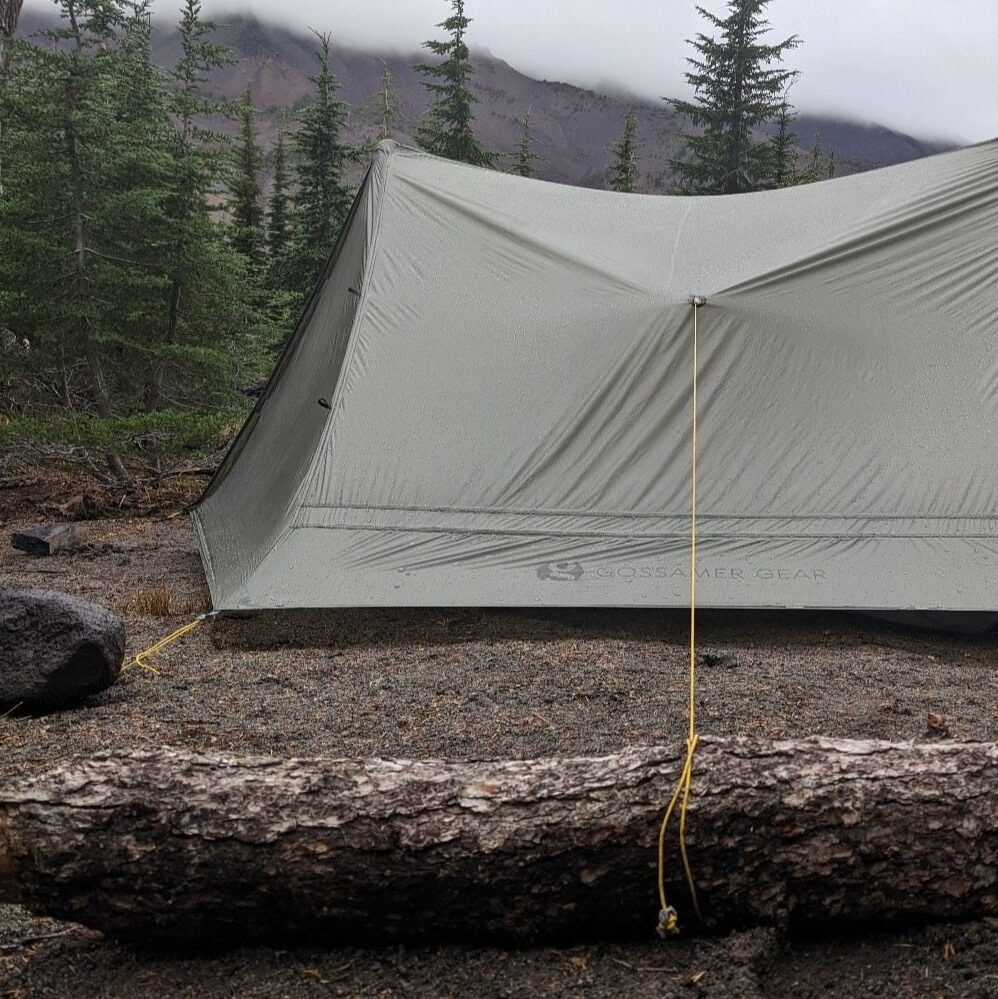
BEST GUYLINES
Most tents come with pre-attached guylines, but some – especially ultralight tents – will include them in the package but require you to attach your own. Either way, you may choose to switch the included guylines out for a lighter, stronger, or more visible option. Below are some of our favorites:
- Guylines with a great balance of strength to weight: HMG 1.4 mm UHMWPE
- Ultralight high-visibility guylines: Zpacks 1.3 mm Reflective Z Line & Zpacks 1.3 mm Z Line
- Affordable & strong guyline: PMI 3 mm Utility Cord
BEST TENT STAKE MALLETS
For frontcountry camping when weight is not an issue, we’ll often bring along a stake mallet to make quick work of pounding tent stakes into the ground.
- Best budget stake mallet: Coleman Rubber Mallet
- Durable metal stake hammer with a built-in bottle opener: MSR Stake Hammer
- Affordable & lightweight plastic stake mallet: Coghlan’s Tent Peg Mallet
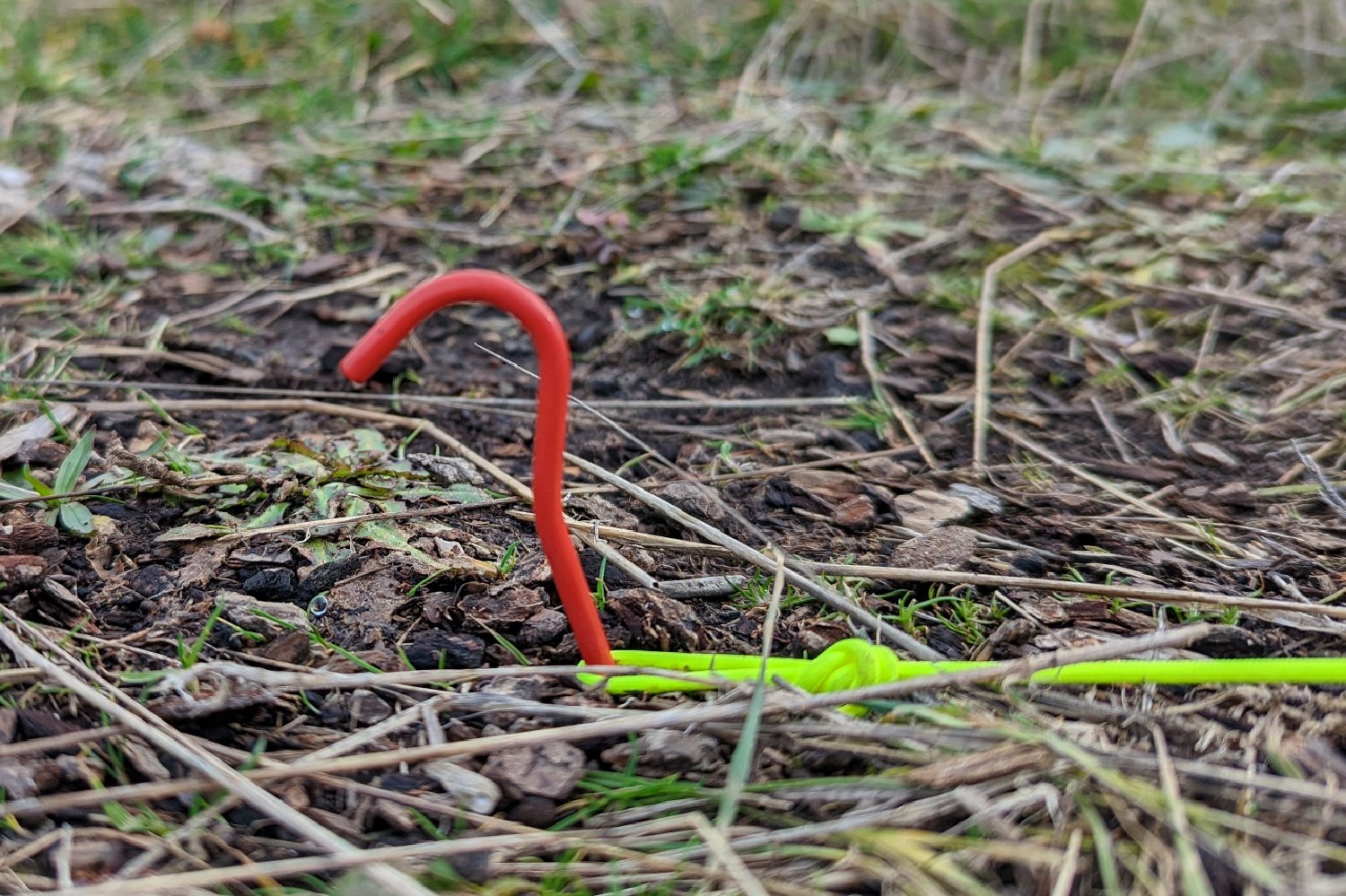
Honorable Mentions
These stakes aren’t on our main list but they still have holding power in our book:
Coleman 10 in. Steel – Slightly more expensive than REI’s Steel Stakes, but a little longer for slightly improved holding power
